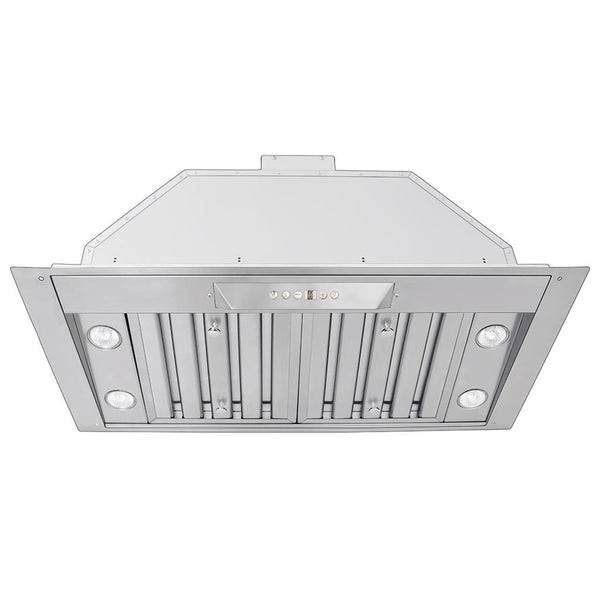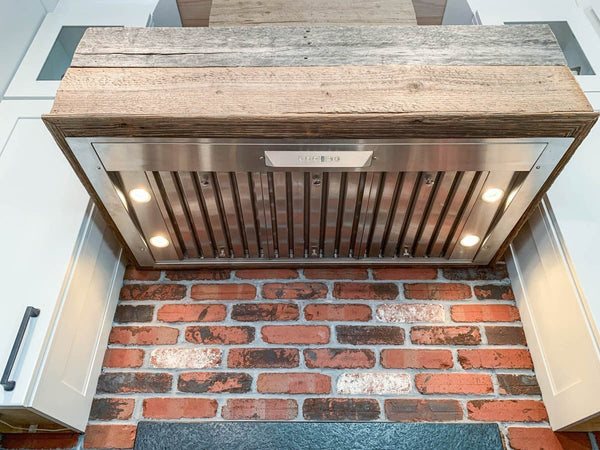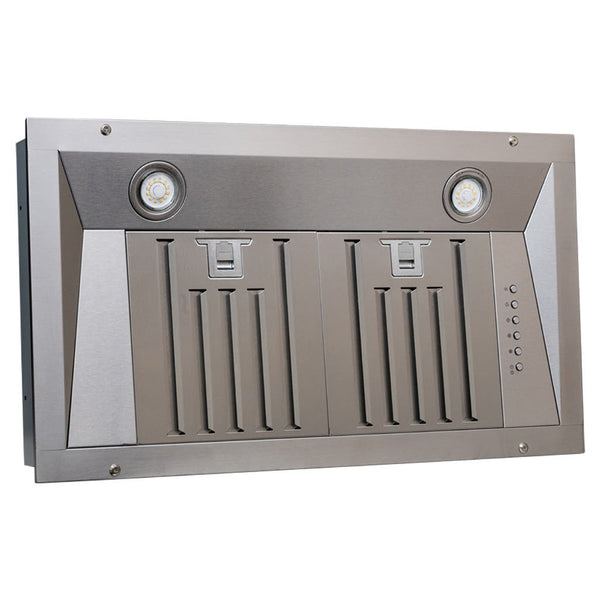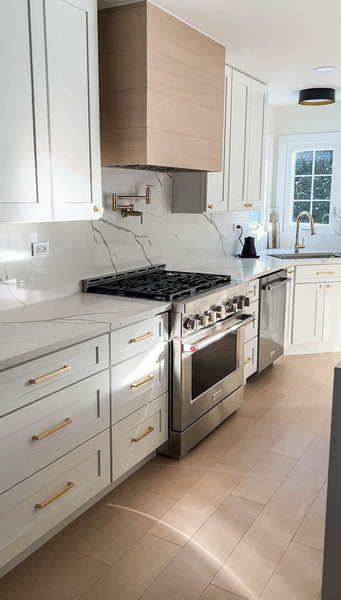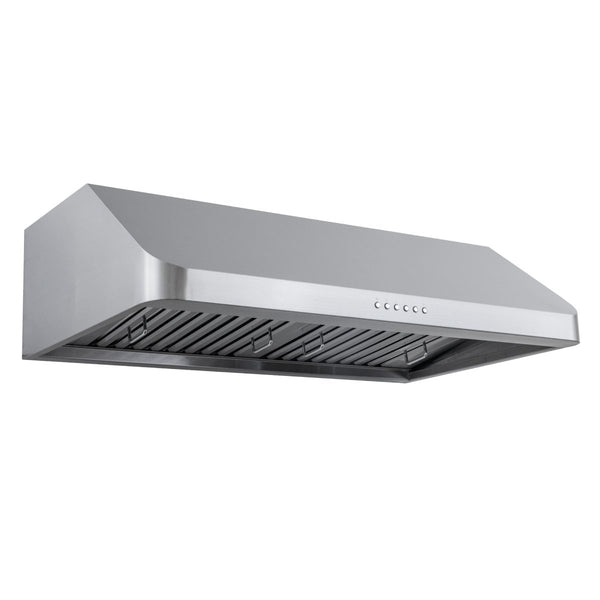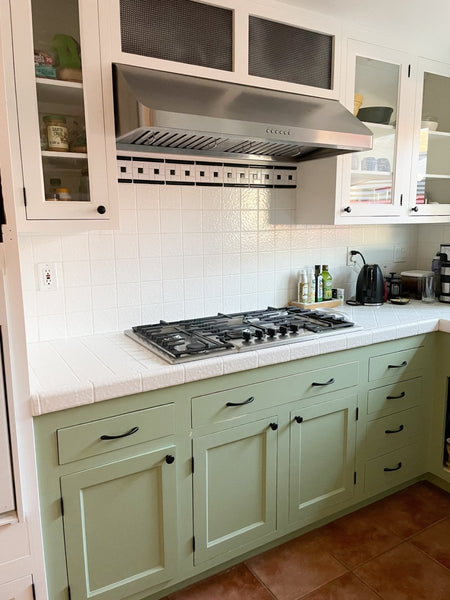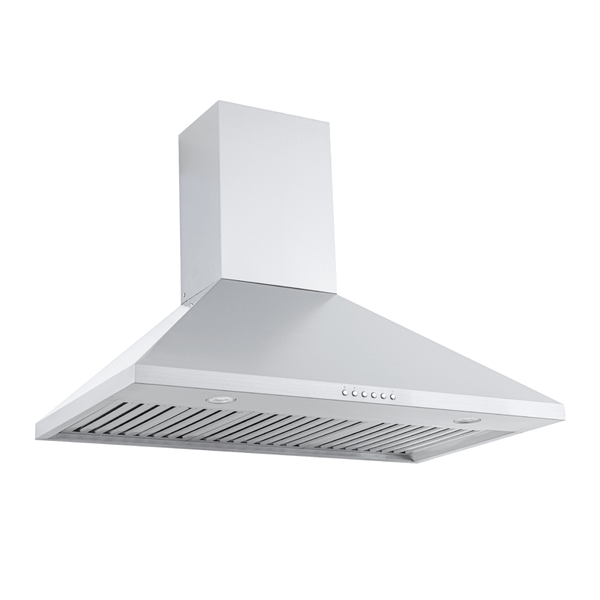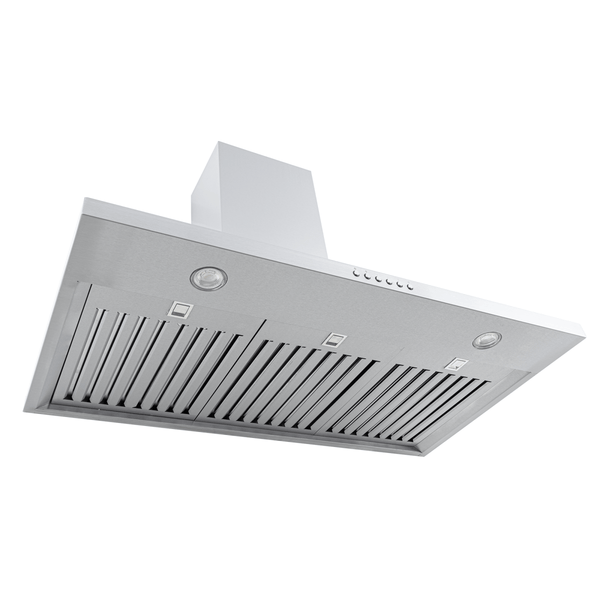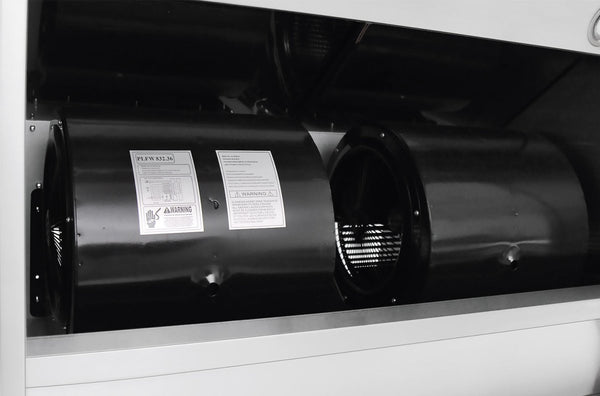No matter how carefully you clean your kitchen, grime and grease can build up fast. Even if you wipe everything down at the end of the day, from time to time, your kitchen will need good a deep clean.
But deep cleaning a kitchen doesn’t have to be as horrible as it sounds. With these DIY homemade kitchen cleaning solutions, you can save money, and avoid the harsh chemicals that are common in commercial cleaners.
Common kitchen items such as white vinegar and baking soda can be quickly transformed into effective kitchen cleaning recipes. Read on to discover our favorite kitchen cleaning recipes (that actually work).
Safety Tip
Homemade kitchen cleaning products can be an excellent way to clean your kitchen effectively on a budget, and avoid some nasty chemicals. However, safety has to be your top priority.
Never mix bleach cleaning products with ammonia cleaning products. When combined, these two substances will create dangerous fumes. To avoid disasters, closely read product labels before you start making your own cleaners.
All Purpose Cleaning Spray
- 1 cup distilled white vinegar
- 1 cup water
- Rind of one lemon
- Rosemary sprigs
The all purpose cleaning spray is an essential kitchen tool. It can be used for wiping down countertops and stove tops, to remove the general grime that builds up in a kitchen.
This recipe is not only effective but also pleasant to use. While other all purpose sprays can have a harsh, chemical smell, our homemade recipe is gently scented.
Mix all the ingredients together in a bowl, and pour into a spray bottle. Give it a good shake, and you can use the spray straight away. However, the spray gets better with time. After a week, the rosemary and lemon will have been properly infused.
A word of caution: avoid using vinegar based sprays on granite.
All Purpose Cleaning Scrub
- 1 ½ cups baking soda
- ½ cup liquid laundry soap
- Essential oil
Scrubs are a good way for removing tough stains, particularly if you’re attempting a deep clean. This recipe is incredibly simple, using only two ingredients (essential oil is optional).
The baking soda can cut through dirt and grime, while the liquid laundry soap makes application easier, and adds sparkle.
In a bowl, mix together the baking soda and liquid laundry soap until it forms a thick paste. Add a few drops of your preferred essential oil (such as rosemary, lavender, or lemon). To use, apply to dirty surfaces, and wipe away with a damp cloth.
Store the paste in a sealed container. If it starts to dry out, a few drops of water, and stir.
Homemade Kitchen Cleaning Wipes
- 15 to 20 squares scrap fabric
- Large mason jar
- 1 cup water
- ¼ cup white vinegar
- 8 drops tea tree essential oil
- 8 drops lemon essential oil
- 8 drops eucalyptus essential oil
Wipes are ideal for a quick and easy clean, but disposable wipes are a nightmare for the environment. This homemade recipe not only offers effective easy cleaning but also reduces waste.
To make this cleaning recipe, you need between 15 and 20 scraps of fabric. This can be old clothing, old dish towels, or any materials you might have hanging around. Place the fabrics in your mason jar.
In a separate bowl, combine the water, vinegar, and essential oils, and stir. Pour the mixture into the mason jar, over the cloth. Seal the lid, and give the jar a vigorous shake. Leave to soak, and pull a cloth out next time you want a quick clean.
Each cloth can be washed and reused.
No-Vinegar Kitchen Cleaner
- 2 gallons water
- 2 tablespoons Castile soap
- 5 drops tea tree essential oil
Vinegar is an excellent natural cleaner, but as it’s acidic, it isn’t safe on all surfaces. Granite, marble, and some hardwoods can’t be cleaned with vinegar.
This recipe instead uses Castile soap, an oil-based soap with exceptional cleaning abilities. Mix the liquid soap with water and stir gently — you want it well mixed, but not too bubbly. A few drops of tea tree oil add a pleasant smell.
Appliance Cleaner
- 2 tablespoons baking soda
- 1 tablespoon Castile soap
- 2 cups water
Baking soda has two incredible properties: it can shine stainless steel, and it can remove bad smells. For a really quick solution to bad odors, pour baking soda down your garbage disposal and drain.
Alternatively, mix baking soda and water to create a solution, and use it to clean stainless steel appliances. This recipe makes a thin paste, which should be applied to surfaces using a damp cloth. Rub the paste with the metal grain, and rinse away.
Grease Cleaner
- 1 cup white vinegar
- 2 drops liquid soap
- 1 tablespoon baking soda
- 2 cups water
- Essential oil
In an active kitchen, grease can build up without you realizing it. It’s important to clean frequently using solutions that actually cut through and remove grease. Not all kitchen cleaners are effective against grease.
The liquid soap in this recipe cuts through grease and stains, while the vinegar sanitizes. The baking soda adds a gentle abrasion, so you can really clear even old grease. Add a few drops of your favorite essential oil to improve the scent.
Spray the solution directly onto greasy surfaces, wipe using a clean sponge, and rinse away using a damp sponge.
Or Try This Grease Cleaner
- ½ cup sudsy ammonia
- 1 gallon of water
Sudsy ammonia can be used as an all purpose cleaner, but where it really excels is banishing grease on metal. Pour ½ cup into a one gallon bucket, and fill the bucket with water.
This is an excellent recipe if you need to clean a particularly dirty oven. Use it on the range hood, the oven racks, and the grill. If a little extra cleaning power is necessary, soak the rack and grill in the bucket with a tablespoon more of ammonia.
While you can use ammonia on many surfaces, avoid using it on aluminum, as it can cause staining.
Microwave Cleaner
- 2 tablespoons white vinegar
- 2 cups water
- Essential oil
It can be surprising just how much mess can build up in a microwave, and how quickly it can become caked on. This recipe is an excellent method for cleaning a microwave with minimal fuss.
In a microwave safe bowl, combine the water and white vinegar. If you want, add a few drops of your favorite essential oil, to mask the vinegar smell.
Place the bowl in the microwave, and microwave on high for five minutes. It should heat up and start to steam. When the cooking time has finished, leave the bowl in the microwave with the door closed for at least 10 minutes, so it can cool down.
Remove the bowl and glass plate from the microwave, and wipe down the interior of the microwave with a soft cloth. Use the remaining vinegar and water mix to remove any particularly stubborn stains.
Window Cleaner
- ½ cup white vinegar
- 2 cups water
- ¼ cup rubbing alcohol (70% concentration)
- Essential oil
Windows in the kitchen become dirty from the steam and smoke you create when cooking, and they’ll often need more care and attention than the other windows in the home. Luckily, this easy solution can leave your windows gleaming.
In a bowl, combine the white vinegar, water, and rubbing alcohol. The alcohol helps the solution evaporate quicker, so it’s less likely to leave streaks and spots behind. Add a few drops of your favorite essential oil, to improve the smell.
It’s always best to clean windows on an overcast day. Direct sunlight causes the solution to dry quickly, which leads to streaking.
Check out the best kitchen degreasers here.
Brass Cleaner
- Lemon juice
- Table salt
Fixtures can often go overlooked in the kitchen, while you focus on cleaning the larger, more obvious surfaces. This quick brass cleaner recipe ensures every corner of your kitchen is sparkling, and it uses two ingredients you probably already own: lemon juice and table salt.
Moisten a sponge using a few drops of lemon juice, and cover with a light sprinkling of salt. Lightly rub the cloth over your fixtures, and rinse with a damp cloth. Dry immediately.
One Final Safety Tip
While some of these cleaners are used once and thrown away, some of them can be bottled and stored in the kitchen.
If you do store the solution, make sure to clearly label the bottle. Include what the solution is for, what it contains, and when it was made.
This small step is essential to ensure you avoid accidentally mixing products that can be dangerous. It also means you won’t accidentally spray your acidic cleaner on your granite countertops!
Final Thoughts
Homemade cleaning solutions make use of products you’re likely to already own, providing a handy solution to common cleaning troubles.
They’re particularly useful if you want to avoid harsh chemicals in the kitchen, or you’re sensitive to powerful smells.
No kitchen stays sparkling forever, but with these homemade recipes that actually work, you can keep your kitchen cleaner for longer.
